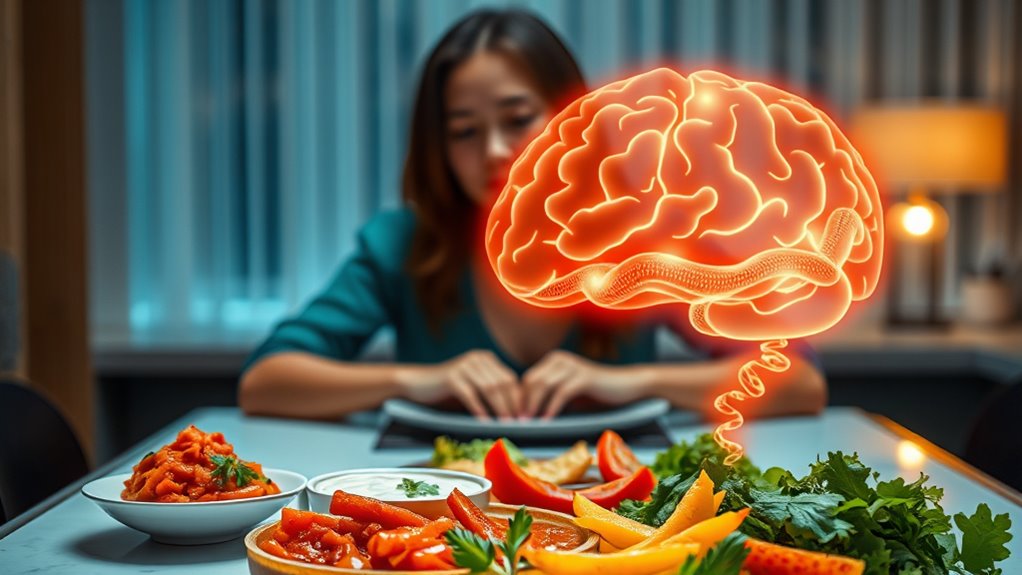Your gut microbiome communicates with your brain through various pathways, including the vagus nerve and microbial metabolites like neurotransmitters and short-chain fatty acids. Eating a balanced, nutrient-rich diet—rich in fiber, omega-3s, and fermented foods—can promote beneficial bacteria that support mood, reduce inflammation, and boost mental health. By understanding how diet influences these microbial signals, you can take steps toward better emotional resilience and brain function as you explore further.
Key Takeaways
- Diet influences gut microbiota composition, which produces neurotransmitters and metabolites affecting mood and cognitive function.
- Consuming fiber-rich and omega-3 foods promotes beneficial bacteria that support mental health and reduce inflammation.
- Fermented foods introduce probiotics that enhance gut-brain signaling via the vagus nerve.
- Poor diets high in processed sugars and refined carbs disrupt gut balance, potentially worsening anxiety and depression.
- Nutrients like short-chain fatty acids and tryptophan metabolites from gut microbes help regulate mood and brain inflammation.
Understanding the Microbiota–Gut–Brain Axis

The microbiota–gut–brain axis is a complex communication network that connects your gut microbiota with your central nervous system. You might not realize it, but your gut and brain constantly exchange information through multiple pathways. Microbes in your gut produce neurotransmitters and neuroactive compounds that influence your mood and cognition. They also send signals via the vagus nerve, a direct neural highway between gut and brain. Additionally, microbial metabolites enter your bloodstream, reaching your brain and affecting its chemistry. Your immune system plays a role too, with gut microbes modulating inflammation that impacts mental health. This integrated system is dynamic and influenced by diet, meaning what you eat can profoundly shape this gut-brain communication network. Research indicates that microbial composition plays a crucial role in maintaining mental wellness and can be modified through dietary choices. Understanding this axis helps explain how gut health directly impacts your mental wellness.
How Gut Bacteria Influence Mood and Behavior

Your gut bacteria produce neurotransmitters like serotonin and GABA that directly influence your mood and behavior. Changes in these microbial populations can lead to feelings of depression or anxiety, depending on which bacteria are dominant. By supporting beneficial bacteria with a healthy diet, you can positively impact your mental well-being. Additionally, maintaining a balanced microbiome is crucial for website performance metrics, which helps ensure optimal mental health outcomes.
Microbial Production of Neurotransmitters
Gut bacteria directly influence mood and behavior by producing neurotransmitters and neuroactive compounds that can alter brain chemistry. These tiny microbes synthesize key chemicals like serotonin, dopamine, and GABA, which regulate your emotions and mental state. Here’s how they impact you:
- They produce up to 95% of your body’s serotonin, affecting your mood, sleep, and appetite.
- They generate dopamine, influencing motivation, pleasure, and focus.
- They create GABA, helping to reduce anxiety and promote calmness.
- Emerging research suggests that gut bacteria can also modulate brain function through immune pathways and neural signaling.
Bacterial Impact on Mood
Emerging research shows that gut bacteria actively shape your mood and behavior by producing neuroactive compounds that communicate with your brain. These microorganisms synthesize neurotransmitters like serotonin, dopamine, and GABA, which influence feelings of happiness, motivation, and anxiety. Beneficial bacteria, such as Lactobacillus and Bifidobacterium, help maintain a balanced mood by reducing inflammation and supporting neural signaling. Conversely, an overgrowth of bacteria like Eggerthella can contribute to depressive symptoms by disrupting this balance. Your diet directly impacts these bacteria; fiber-rich foods promote diverse, mood-boosting microbes, while processed foods can foster harmful populations. Research into Gold IRA Rollovers highlights how diversifying your assets can improve overall financial wellness, similar to how nurturing gut health supports mental health. By nurturing your gut microbiota, you support a healthier mental state, making your diet a powerful tool for mood regulation.
Dietary Patterns That Support Mental Health

Adopting dietary patterns that prioritize nutrient-dense foods can substantially enhance mental health by supporting the gut-brain axis. To do this effectively, focus on incorporating:
Prioritize nutrient-dense foods to boost mental health and support the gut-brain connection.
- Plenty of vegetables and fruits to boost gut microbial diversity and provide essential vitamins.
- Healthy fats like omega-3s from fish, flaxseed, or walnuts to support brain cell function.
- Whole grains, nuts, and legumes that supply fiber and nutrients critical for reducing inflammation and oxidative stress.
- Being mindful of AI safety considerations in health research ensures that dietary recommendations are based on reliable and unbiased information, enhancing their effectiveness and trustworthiness.
These foods help nourish beneficial gut bacteria, promote neurotransmitter synthesis, and lower inflammation—all crucial for mental wellness. By emphasizing a balanced, nutrient-rich diet, you’ll support both your gut health and emotional resilience, creating a foundation for improved mood and cognitive function.
The Role of Microbial Metabolites in Brain Function

Microbial metabolites serve as essential messengers that link the gut microbiota to brain function. These compounds travel through your bloodstream, influencing neurotransmitter production, mood, and cognition. For example, short-chain fatty acids like butyrate support brain plasticity, while tryptophan-derived metabolites regulate serotonin levels. The table below highlights key microbial metabolites and their effects:
| Metabolite | Source | Impact on Brain |
|---|---|---|
| Short-chain fatty acids | Fiber fermentation | Reduce inflammation; promote neuroplasticity |
| GABA precursors | Certain Lactobacillus strains | Modulate anxiety and stress responses |
| Tryptophan metabolites | Protein breakdown | Influence serotonin synthesis |
| Indole compounds | Bacterial amino acid metabolism | Affect mood regulation |
These metabolites act as signaling molecules, shaping your mental well-being through complex biochemical pathways. Additionally, understanding microbial metabolite production can help in developing targeted dietary strategies to enhance mental health.
Vagus Nerve: The Neural Highway Between Gut and Brain

The vagus nerve acts as a direct communication line between your gut and brain, transmitting signals influenced by your microbiota. When gut microbes send chemical messages through this nerve, they can affect your mood and mental state. Understanding this neural highway helps explain how gut health impacts your emotional well-being. Additionally, supporting environmentally sustainable practices in food sourcing and consumption can further promote overall health and well-being.
Vagus Nerve Functionality
The vagus nerve serves as a critical communication highway between your gut and brain, transmitting signals that influence mood, cognition, and overall mental health. Its functionality depends on several factors:
- Neural signaling: It sends rapid messages from your gut’s sensory neurons directly to your brain, helping regulate stress and emotional responses.
- Chemical modulation: The vagus nerve responds to microbial metabolites and neuroactive compounds, adjusting your mood and mental clarity.
- Inflammation control: It helps reduce systemic inflammation by activating anti-inflammatory pathways, supporting mental resilience.
When your vagus nerve functions ideal, it promotes a balanced gut-brain connection, improving mood and cognitive function. Conversely, impaired vagal activity can contribute to anxiety, depression, and cognitive decline, emphasizing its crucial role in mental wellness.
Microbial Signal Transmission
Signals originating from gut microbes influence brain function through the vagus nerve, which acts as a direct communication highway between your gut and your brain. Microbes send chemical signals, including neurotransmitters and metabolites, that activate vagal pathways. These signals can modulate mood, stress responses, and cognitive processes. The table below highlights key microbial signals and their effects:
| Microbial Signal | Source/Type | Impact on Brain |
|---|---|---|
| Serotonin | Gut bacteria | Regulates mood and anxiety |
| Short-chain fatty acids | Fermentation products | Support brain inflammation control |
| GABA | Certain probiotics | Reduces stress and anxiety |
This communication influences your mental wellness, emphasizing how your gut microbiota can shape your brain function. Understanding the mechanisms behind microbial signaling can help develop targeted interventions for mental health.
Impact on Mood
Your gut communicates with your brain through the vagus nerve, serving as a direct neural highway that influences mood and emotional states. When your gut bacteria produce neurotransmitters like serotonin or send signals via microbial metabolites, the vagus nerve relays these messages to your brain. This process impacts your feelings, stress response, and overall mental wellness. Home Furnishings safety features, such as auto shut-off in electric heated mattress pads, help prevent overheating and ensure safe use while you’re sleeping. Here’s how it works: 1. Beneficial bacteria stimulate the vagus nerve, enhancing feelings of calm and happiness. 2. Gut inflammation or dysbiosis can impair vagal signaling, leading to anxiety or depression. 3. Diets rich in fiber and omega-3s promote microbial diversity, supporting healthy vagus nerve communication.
Nutrients Crucial for Brain Chemistry and Mood

Nutrients play a vital role in shaping brain chemistry and mood by providing the building blocks for neurotransmitter synthesis and supporting neuronal function. Your body depends on specific nutrients to produce mood-regulating chemicals like serotonin, dopamine, and GABA. For example, amino acids such as tryptophan and tyrosine are essential precursors. Healthy fats, especially omega-3s, maintain cell membrane integrity and facilitate neurotransmission. Vitamins and minerals act as cofactors in critical enzymatic reactions. Below is a table highlighting key nutrients and their roles:
| Nutrients | Functions |
|---|---|
| Tryptophan | Precursor to serotonin, mood regulation |
| Omega-3 fatty acids | Brain cell structure, neurotransmitter function |
| Vitamin B6, B12 | Neurotransmitter synthesis, energy production |
| Magnesium | Supports nerve signaling and relaxation |
| Zinc | Modulates neurotransmitter activity |
Evidence From Clinical Studies on Diet and Mental Wellness

What does the current scientific evidence reveal about the impact of diet on mental health? Research shows that diet markedly influences mental wellness through changes in gut microbiota and brain chemistry. Here are three key findings:
- Diets rich in fiber and omega-3s are linked to lower depression and anxiety rates.
- Processed foods high in sugar promote inflammation, worsening mood and cognitive function.
- Clinical trials demonstrate that dietary interventions improving microbiota diversity can reduce depressive symptoms.
While more studies are needed, these results highlight the potential of targeted nutrition to support mental health. Personalized dietary approaches based on individual microbiota profiles may enhance effectiveness. Overall, evidence confirms that what you eat can directly impact your mental well-being.
Practical Dietary Tips for Enhancing Gut and Brain Health

To optimize gut and brain health, incorporating specific dietary habits can make a significant difference. Focus on eating a variety of fiber-rich foods like vegetables, fruits, nuts, and whole grains to boost beneficial bacteria. Include omega-3 fatty acids from fatty fish, flaxseed, or walnuts to support brain cell integrity and neurotransmitter production. Limit processed foods, refined sugars, and excessive alcohol, which promote inflammation and disrupt microbiota balance. Prioritize fermented foods like yogurt, kefir, sauerkraut, or kimchi to introduce probiotics that enhance gut diversity. Stay consistent with balanced meals to maintain stable blood sugar and mood. Hydrate well and consider reducing intake of artificial additives. Additionally, understanding the importance of fresh juices, such as lemon or pineapple juice, can contribute to overall health—juice quality directly impacts nutrient intake and gut health. These practical steps help strengthen the microbiota–gut–brain axis, supporting mental wellness through dietary choices.
The Future of Personalized Nutrition and Mental Health

As research advances, personalized nutrition is poised to transform mental health care by tailoring dietary interventions to individual microbiota profiles. You’ll soon benefit from customized plans that optimize your gut-brain connection. Here are three key developments to watch:
- Microbiome Testing: Analyzing your unique gut bacteria will guide targeted dietary strategies.
- Precision Diets: Customized meal plans will focus on supporting beneficial microbes linked to mood and cognition.
- Adaptive Interventions: Ongoing monitoring will allow adjustments, maximizing mental health improvements over time.
This approach moves beyond generic advice, empowering you to enhance your mental wellness through diet tailored specifically to your microbiota. As technology advances, personalized nutrition will become a cornerstone of mental health treatment, offering more effective, individualized support.
Frequently Asked Questions
Can Specific Foods Directly Improve Mental Health Symptoms?
Yes, eating specific foods can directly improve your mental health symptoms. Incorporate fiber-rich fruits, vegetables, and whole grains to boost beneficial gut bacteria that influence mood. Add omega-3 fatty acids from fish or flaxseed to support brain cell function. Limit processed, sugary foods that increase inflammation. These dietary choices enhance gut-brain communication, reduce oxidative stress, and promote neurotransmitter production, helping you feel calmer, more focused, and emotionally balanced.
How Quickly Can Diet Changes Influence Gut Microbiota and Mood?
You can notice changes in your gut microbiota within days to weeks of adjusting your diet. These shifts can positively impact your mood relatively quickly, especially if you increase fiber and omega-3 intake while reducing processed foods. Consistent healthy eating fosters beneficial bacteria, which produce mood-regulating neurotransmitters like serotonin. Over time, these microbial changes support better mental wellness, making dietary habits a powerful tool for mood improvement.
Are Probiotic Supplements Effective for Mental Wellness?
Probiotic supplements can be effective for mental wellness, especially when they contain strains like Lactobacillus and Bifidobacterium, which support beneficial gut bacteria. You should choose high-quality products and consider pairing them with a nutrient-rich diet to maximize benefits. While some people see mood improvements within weeks, responses vary based on individual microbiota. Consistent use and a balanced diet enhance their positive impact on your mental health.
What Role Do Genetics Play in Diet-Gut-Brain Interactions?
Think of your genes as a blueprint, shaping how your gut microbiota responds to diet. They influence your microbiome’s composition, immune responses, and neurotransmitter production, affecting your mental wellness. While you can’t change your genetics, understanding them helps you tailor your diet and lifestyle choices. This personalized approach can optimize gut-brain interactions, supporting mood and cognition by working with your genetic predispositions rather than against them.
How Does Stress Affect the Gut-Brain Axis and Dietary Impact?
Stress directly impacts your gut-brain axis by disrupting microbial balance, increasing inflammation, and altering gut permeability. When you’re stressed, your body releases hormones that can suppress beneficial bacteria and promote harmful ones, affecting neurotransmitter production like serotonin. This imbalance can lead to mood changes and cognitive issues. To counteract this, focus on stress-reducing activities, maintain a balanced diet rich in fiber and omega-3s, and support your gut health for better mental resilience.
Conclusion
You might think changing your diet won’t make a difference, but even small adjustments can markedly boost your mental wellness. Prioritizing gut-friendly foods supports your microbiota–gut–brain axis, improving mood and clarity. Remember, you’re in control of your health journey—it’s never too late to nourish your gut, foster better mental health, and enjoy the benefits of a balanced, vibrant life. Start today, and trust that your choices have the power to transform your mind and body.









